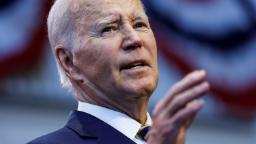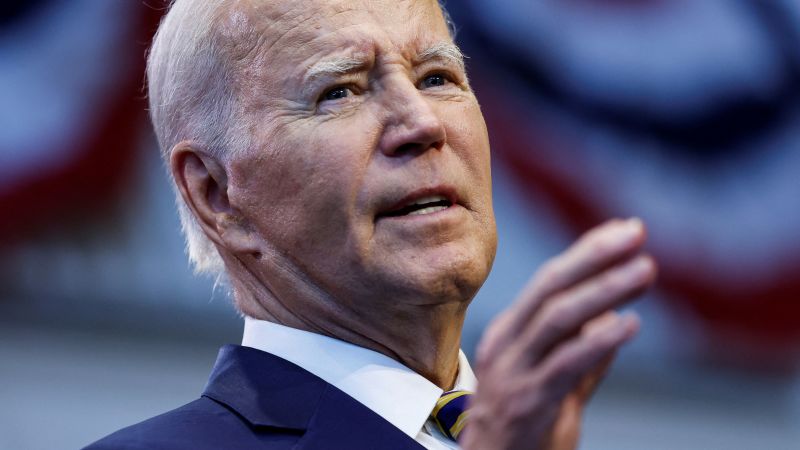
New York
CNN
—
The White House is shrugging off concerns the United Nations General Assembly won’t pack a policy punch this year, with President Joe Biden set to deliver an address Tuesday to an audience missing several key heads of state.
In remarks to the 78th UN General Assembly, Biden, a senior administration official told reporters, “will lay out for the world the steps that he and his administration have taken to work with others to solve the world’s most serious challenges.”
“He will outline his vision for how countries, working within reformed and modernized international institutions, can harness their efforts to end conflict, defend human rights and the rule of law, and help countries develop their economies,” the official added.
Biden is also expected to touch on “significant foreign policy successes” of his presidency, making a pitch for the US’ role in the world heading into the 2024 US presidential campaign. As the president seeks a second term, there is some unease from world leaders about what that role could looks like following next year’s election.
The annual UN talks are unfolding for the second year under the shadow of the war in Ukraine, and the conflict will remain a focus for leaders. While the UN has led on organizing humanitarian aid during the conflict, it hasn’t acted as a mediator in the war.
This year, the nations of the “global south” are also demanding attention from leaders. Many have watched with skepticism as the West rallies attention and funding for Ukraine while their crises go unnoticed.
Biden will meet Wednesday with Brazil’s President Lula da Silva to discuss labor issues and Israel’s Prime Minister Benjamin Netanyahu, with whom Biden has clashed on the country’s controversial judicial reform plan.
Biden and Netanyahu, the senior official said, will “discuss a range of bilateral and regional issues focused on the shared democratic values between our two countries and a vision for a more stable and prosperous and integrated region, as well as compare notes on effectively countering and deterring Iran.”
But with high-level absences from Russia, China, France, and the UK – all permanent members of the UN Security Council – the Biden administration will be relegated to lower-level engagements with key allies and adversaries, all while hoping to elevate the United States’ views of global infrastructure, food security, democratic values, and territorial sovereignty.
“The fact that President Biden is here really exemplifies how important we see his role as the leader on the multilateral stage,” US Ambassador to the UN Linda Thomas-Greenfield said last week at the Council on Foreign Relations.
As the US seeks to counter the authoritarian pull of Russia and China, Biden is joining the presidents of five Central Asian nations – Kazakhstan, Kyrgyzstan, Tajikistan, Turkmenistan, and Uzbekistan – for the “first-ever so-called C5+1 presidential summit” on Tuesday, the first senior official said, for a discussion on regional security, trade and connectivity, climate, and reforms to improve governance and the rule of law.
A major challenge for the Biden administration’s ability to generate attention and headlines for its foreign policy goals: Forum fatigue, with the G20 meeting of world leaders, BRICs summit of developing countries, APEC gathering focused on Indo-Pacific policy, and the climate-focused COP28 conversation all happening in an unusually condensed calendar, taking some of the urgency away from the conversation happening in New York.
“There’s always been a sense that when you can’t get what you want from the UN, you go somewhere else,” said Marti Flacks, director of the Human Rights Initiative at the Council on Strategic and International Studies. “There’s more of them being led by US competitors, particularly China. And so there’s a sense that they are growing in strength.”
Still, Biden officials have cast the gathering as “an essential forum” and “an incredibly rich and important venue” for needle-moving discussions.
“The president understands the importance of showing up to talk to his counterparts,” a second senior US official said.
One of the most high-profile meetings of the week won’t even be happening in New York. Biden will host Ukrainian President Volodymyr Zelensky at the White House on Thursday, before Zelensky meets members of the US Congress on Capitol Hill.
Officials said Biden will seek to balance US commitment to Ukraine with other pressing global challenges during his Tuesday remarks.
“When we’re accused of focusing too much attention on Ukraine,” Thomas-Greenfield said, it’s important that the US can show it “can deal with Ukraine as well as the rest of the world at the same time.”
Ukraine will “feature prominently” in Biden’s remarks, the senior official said, but the president will “also speak to a lot of other things that are on our agenda and a lot of other issues that we’re making progress in.”
Biden, the official added, will speak to the US “commitment to the principles that are at play in some of the world’s most serious conflicts right now, preeminently Ukraine, and what we’re going to do to make sure that the UN Charter is upheld and to strengthen the coalition in favor of Russia’s independence in light of a brutal conflict and also reiterate our commitment to human rights worldwide.”
But there are areas where the administration acknowledges progress will remain elusive. National security adviser Jake Sullivan said he’s not optimistic UN leadership and partner countries can make progress reinstating the Black Sea grain initiative, despite UN Secretary General António Guterres holding meetings on it with Zelensky and other partners New York this week.
“We know the Turks are working hard at this; Guterres is working hard at this,” Sullivan told reporters. “But the Russians are not giving us a huge amount of cause for optimism at this moment.”
The issue raises the broader question of UN efficacy, with Russia remaining a member of the United Nations Security Council, despite multiple demands from the council to end the war in Ukraine. Thomas-Greenfield said the US is working closely with Ukrainians to document war crimes and atrocities for “future prosecution” – but it remains unclear when any such tribunal would take place.
CSIS’s Flacks noted that the rise in leadership of other regional organizations and groupings, including the G20 and BRICs, begged a critical question to this gathering of leaders:
“Does a slower-moving and more deliberative organization, like the UN, still matter in our international system?” she asked.
To Flacks – and the Biden administration – the answer remains yes.

